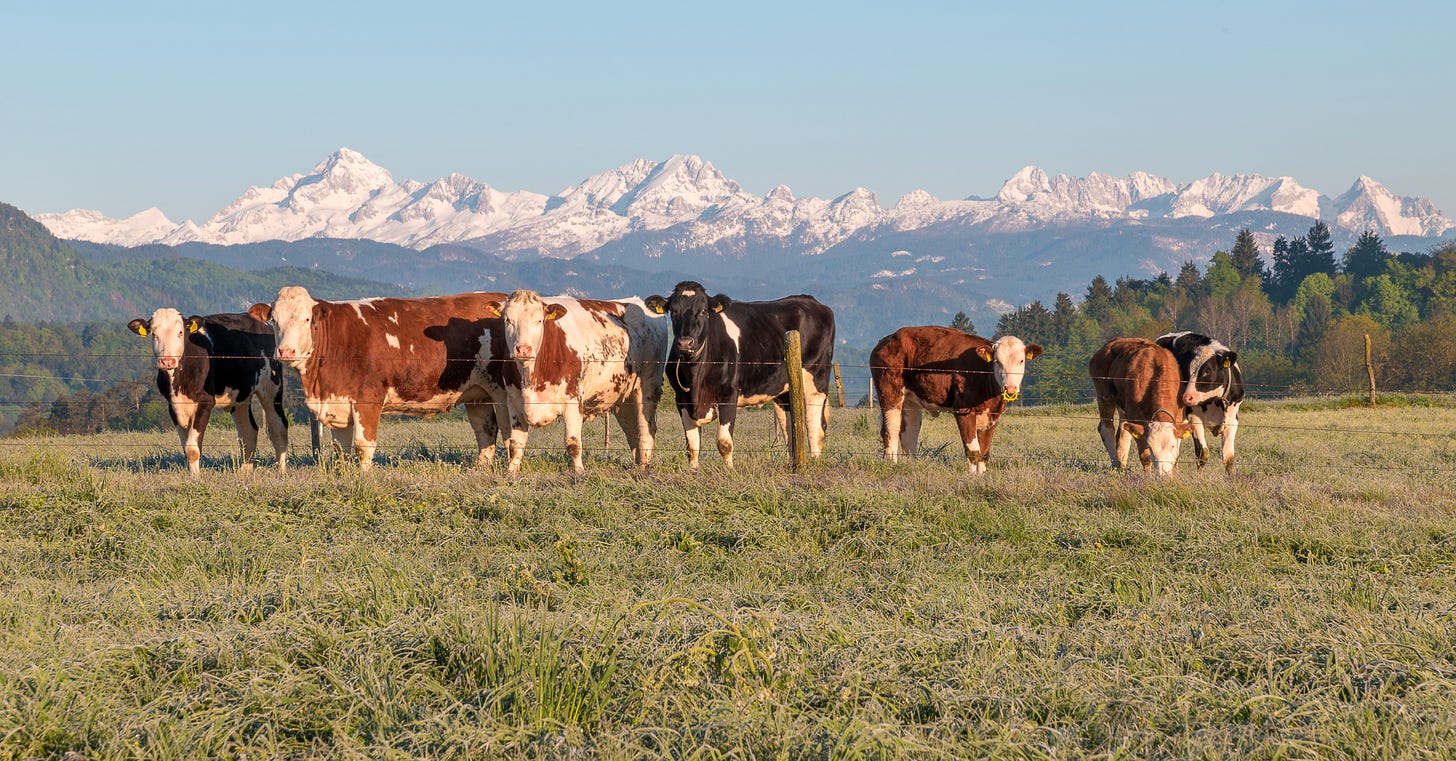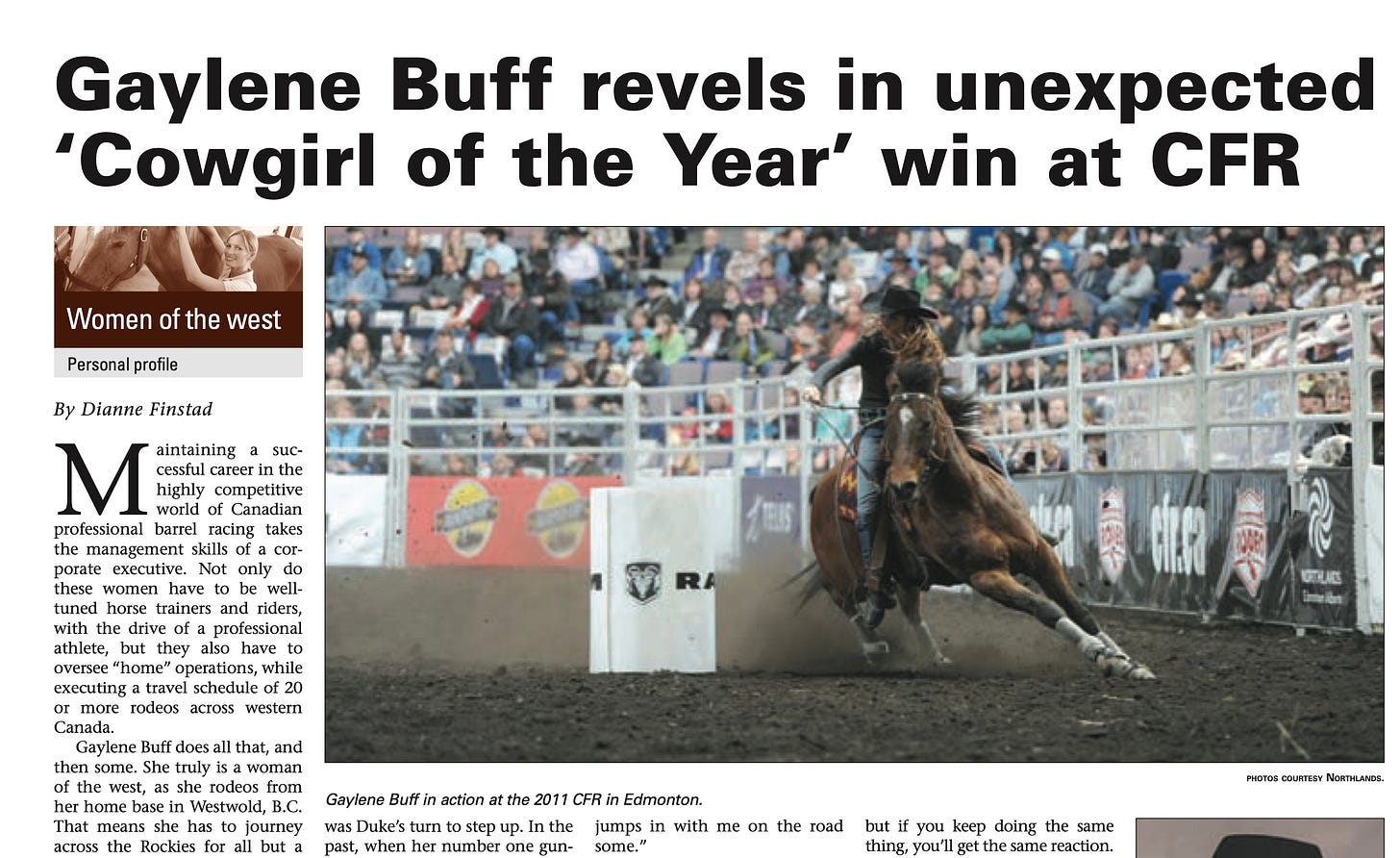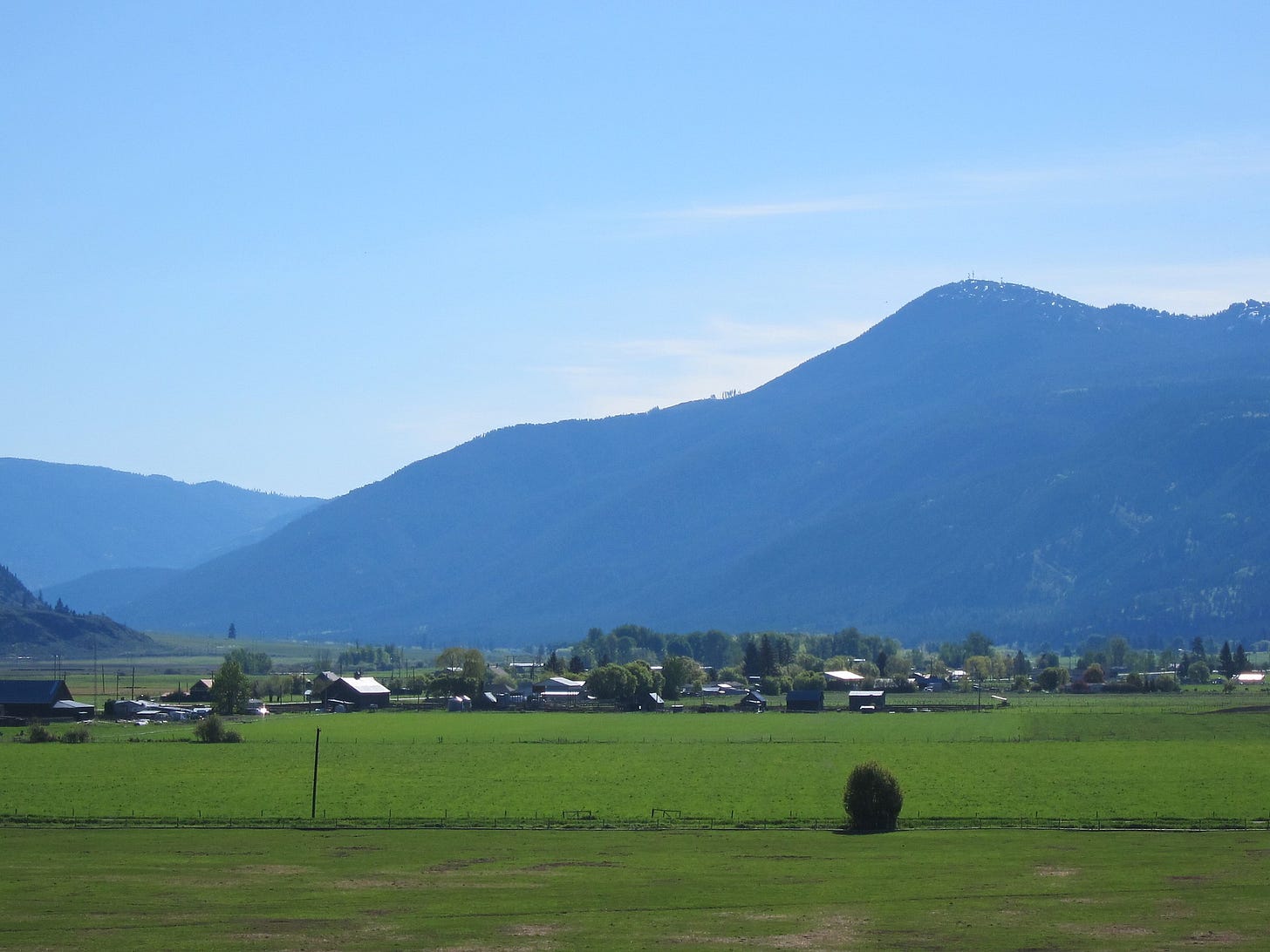They Tried to Feed Their Cattle. Now the Government wants them in jail.
398 Ranchers Didn't All Comply. One Family Faces Prison. The Crown's Targeting of the Buffs Sparks Outrage.
Westwold, British Columbia
Utah Rodeo Star Turned Rancher Faces Jail in Canada — Just for Feeding Cattle
When drought struck British Columbia in 2023, the government issued a sweeping irrigation ban to protect salmon. Nearly 400 ranchers were affected—but only one family now faces jail time. Erik and Gaylene Buff, operators of One Plus Cattle Co., stand alone in a legal firestorm that has ignited outrage across rural Canada. Who are the Buffs, and why is the Crown making an example out of them? The full story uncovers what officials won’t say publicly—and why this case could reshape the future of farming in the province.
The Buffs vs. British Columbia: How One Ranch Became Ground Zero in a Water War
When Erik and Gaylene Buff drilled their first well in Westwold, British Columbia, it was just another step in building their dream — One Plus Cattle Co., a family-run ranch in the heart of Canada’s interior. Gaylene Buff was born into a ranching family and raised in the rugged terrain of Nine Mile Canyon, located in southeastern Utah. A U.S. citizen by birth, Gaylene moved to British Columbia where she married Erik Buff and raised two children. Before becoming a full-time rancher, she rose to fame on the rodeo circuit, beginning her barrel racing career in 2007. By 2008, she committed fully to the sport and quickly became one of Canada’s top competitors. Her accolades include: three-time Canadian Finals Rodeo Qualifier, four-time Calgary Stampede Qualifier, two-time Rodeo Houston Qualifier, 2008 Canadian Rookie of the Year, 2008 Calgary Wrangler Tour Finals Champion, 2009 Canadian Ladies Barrel Racing Champion, 2011 Cowgirl of the Year, and two-time Canadian Prairie Circuit Champion.
Decades later, the Buffs find themselves at the center of a legal and political storm, facing potential jail time and $1 million in fines for irrigating their pasture during a government-imposed water ban. They are the only ranchers, out of nearly 400 in the affected region, to face criminal charges. The question many are now asking: why? — One Plus Cattle Co., a family-run ranch in the heart of Canada’s interior. (https://www.castanet.net/news/Vernon/471812/Westwold-ranchers-facing-charges-for-irrigating-during-ban)
Background: One Plus Cattle Co.
One Plus Cattle Co., owned and operated by Erik and Gaylene Buff, has been a staple in the Westwold agricultural community for decades. The ranch was established in the early 1990s and has grown steadily, providing quality cattle to regional markets while maintaining a reputation for ethical land stewardship and quiet dedication to the craft of ranching.
The Buffs have never sought the spotlight. Locals describe them as "hard-working, principled people" who rarely missed a community event or opportunity to lend a hand during emergencies. Their cattle operation has contributed to the local food system, supported feed and equipment suppliers, and brought seasonal jobs to the area.
Despite their modest public profile, their work has not gone unnoticed. Over the years, the Buffs have participated in regional conservation programs, and their ranch has been recognized informally by peers as a model for responsible ranching in semi-arid conditions.
Their sudden appearance at the center of a legal and environmental showdown stunned many in the Westwold area.
The Water Ban: A Crisis of Conservation or Overreach?
In August 2023, amid record-breaking drought conditions, the British Columbia government issued a Fish Protection Order targeting the Salmon River watershed in the Thompson-Okanagan region. Under the province's Water Sustainability Act, ranchers and farmers were banned from irrigating forage crops between August 16 and September 30to protect endangered Chinook salmon during their spawning season. (https://news.gov.bc.ca/releases/2023FOR0041-001307)
Officials argued that even shallow groundwater extraction could reduce surface flow levels critical to salmon survival. The watershed had reached Level 5 drought severity, the highest classification. (https://www.kamloopsthisweek.com/local-news/one-plus-cattle-co-of-westwold-facing-charges-for-irrigating-during-water-ban-8418259)
Yet many in the agricultural community questioned the science. Several local hydrologists disputed the assumption that all wells were hydraulically connected to the river, especially given the geological diversity of the region. Forage growers pointed out that they weren’t diverting water directly from the river, and that vegetables, orchards, and other water-intensive crops were exempt from the ban. (https://www.vernonmorningstar.com/news/one-plus-cattle-co-of-westwold-facing-charges-for-irrigating-during-water-ban/)
"It felt arbitrary," said one rancher. "How does cutting off cattle feed protect fish if our water comes from a completely separate well system?"
A Community on Edge
The ban sent shockwaves through the local farming community. Over 200 residents packed a community meeting in September 2023, demanding answers. Emotions ran high as provincial staff struggled to justify the scope and execution of the order. (https://www.pentictonwesternnews.com/news/westwold-farmers-irate-fear-crops-will-be-lost-as-fish-protection-order-cuts-off-water-4408625)
Seven Members of the Legislative Assembly attended the meeting, including BC United leader Kevin Falcon. But it was MLA Todd Stone who voiced the outrage felt across the ranching community:
"If government refuses to answer your questions, I would turn my ****ing water on."
Frustration stemmed from both the suddenness of the order and the lack of consultation. Ranchers were not given a grace period. Many reported that enforcement officers showed up with no scientific documentation, just legal warnings.
Though roughly 398 water license holders were affected, reports soon emerged that only one ranch was facing criminal charges.
The Buffs: From Compliance to Criminal Charges
The Buffs were known in the Westwold area as hard-working, quiet ranchers who had invested decades into their cattle operation. Their land, like many in the region, relied on groundwater wells for irrigation.
According to reports, provincial water stewardship officers visited the area in early 2024 and met briefly with the Buffs and other farmers to discuss ongoing enforcement. That meeting ended abruptly. Weeks later, the Buffs were charged with two violations:
Irrigating forage crops between August 16 and September 6, 2023.
Obstructing provincial officials, a charge that carries steep penalties. (https://www.kelownacapnews.com/news/one-plus-cattle-co-of-westwold-facing-charges-for-irrigating-during-water-ban/)
If convicted, the Buffs face up to $1 million in fines and one year in jail. (https://www.castanet.net/news/Vernon/471812/Westwold-ranchers-facing-charges-for-irrigating-during-ban)
Why Only the Buffs?
This is the central mystery.
Despite hundreds of water users being subject to the same ban, no other ranchers have been charged. Some were fined. Others issued warnings. But only the Buffs face a courtroom.
Why?
Sources suggest a few possibilities:
Visibility: Their irrigation may have been more easily observed, either through aerial surveillance or complaints.
Alleged confrontation: The obstruction charge implies a dispute with officials, which could have escalated enforcement.
Symbolism: Prosecutors may be using the Buffs as an example to deter future non-compliance.
Politics: Their case exploded in the press and gained public sympathy, making them an awkward figure for a government eager to demonstrate environmental seriousness. (https://www.kamloopsthisweek.com/local-news/bc-united-leader-joins-westwold-water-fight-7452599)
Local MLA Stone pointed to political motivation:
"They're making an example out of honest people just trying to feed their cattle. It's disgraceful."
How does this get resolved?
As of June 2025, the Buffs have not yet had their day in court. Their arraignment was held in March, and trial scheduling is still underway.
Legal experts suggest the case may be difficult to prosecute. Proving that a specific well directly harmed salmon-bearing streams is scientifically complex. Furthermore, the obstruction charge—if based on verbal disagreements rather than physical interference—may be legally weak.
Several legal and factual defenses may work in the Buffs’ favor:
Causal Proof Burden: To obtain a conviction, the Crown must demonstrate that the Buffs’ water use had a direct and material effect on fish-bearing waterways. Yet establishing a clear, causal link between an individual shallow well and the flow of distant salmon streams requires advanced hydrological modeling, which is often inconclusive and easily challenged in court (https://www.cbc.ca/news/canada/british-columbia/bc-water-sustainability-act-1.6897400).
Well Location and Impact: It is not publicly confirmed whether the Buffs’ well draws from an aquifer hydrologically connected to the endangered stream systems. The Buffs claim their shallow domestic well primarily served household and small-scale livestock use, and may have tapped groundwater that is geologically isolated from any salmon habitat. In many regions, such wells have minimal to no measurable impact on river ecosystems—especially during high groundwater seasons or when natural recharge is occurring (https://www.sciencedirect.com/science/article/abs/pii/S1470160X20307060).
Lack of Notice and Due Process: A key element in the case may be whether the Buffs knew or should have known that their well fell under the irrigation ban. During the 2023 drought emergency, communication from the Ministry of Forests and the BC government was inconsistent and often poorly targeted. Numerous farmers across the region have stated they were either not notified, received conflicting information, or were unaware that a domestic-use well could be subject to restrictions typically applied to high-volume agricultural systems (https://thetyee.ca/News/2023/08/16/BC-Drought-Ranchers-Voices-Missing/).
Ambiguity in Drought Orders: The government’s irrigation bans spanned vast regions, sometimes grouping disparate ecological zones into the same regulatory category. This blanket approach—without individualized hydro assessments—may be challenged as overly broad, especially if it failed to consider the scale or ecological relevance of specific wells (https://www.bclaws.gov.bc.ca/civix/document/id/mo/mo/m0115_2023).
Lack of Criminal Intent (Mens Rea): For the obstruction charge to succeed, prosecutors must show that the Buffs acted with deliberate intent to hinder lawful enforcement. If their resistance stemmed from confusion, emotional distress, or peaceful protest rather than physical or deceptive interference, it may fall well below the legal threshold for criminal obstruction under Section 129 of the Criminal Code (https://www.canlii.org/en/ca/laws/stat/rsc-1985-c-c-46/latest/rsc-1985-c-c-46.html#sec129).
Selective Enforcement and Disproportionate Targeting: The Buffs' legal team is likely to raise concerns about discriminatory application of the Water Sustainability Act. Reports show that large-scale commercial operations have continued high-volume water use with limited oversight, while smaller family farms face aggressive enforcement. This raises constitutional questions of fairness and administrative equality (https://www.nationalobserver.com/2023/11/01/news/farmers-bc-heat-drought-irrigation-water).
Agricultural and Animal Welfare Considerations: Canadian courts have occasionally taken into account whether actions taken during emergencies were meant to prevent the suffering of livestock or irreversible economic loss. If the Buffs can show their water use was essential for animal welfare and that no viable alternatives existed, this may support mitigation or dismissal (https://www.fraserinstitute.org/studies/farmers-and-the-freedom-to-farm).
Adding further complexity, Gaylene Buff’s public persona as a celebrated rodeo athlete has garnered sympathy and brought national attention to the case (https://cowboychannel.com/story/45221071/gaylene-buff-wins-2011-cowgirl-of-the-year). For many rural residents, the Buffs represent a broader struggle: the fight to maintain agricultural livelihoods amid increasingly urban-centered environmental governance.
An acquittal could force the province to clarify and refine how it balances environmental protection with the realities of rural life. A conviction, on the other hand, may establish a legal precedent that enables more forceful and less nuanced enforcement in future drought events.
For now, the Buffs continue their work—hauling water by hand, caring for livestock, and preparing for a courtroom battle that could reshape how water rights are enforced across British Columbia’s agricultural heartland.
Editorial Opinion: When Justice Becomes a Warning
The charges brought against the Buffs reveal a deeper flaw in the province's approach to conservation: punishment by example. Using one family—longstanding contributors to their community—as a political and legal deterrent is not justice. It’s targeted persecution.
British Columbia has used this tactic before. In 2018, ranchers in the Cariboo region faced excessive scrutiny and enforcement under fire recovery policies, while neighboring operations under similar conditions received leniency. Selective prosecution erodes public trust and divides rural communities already under pressure.
Worse, this case unfolds in the shadow of a growing food security crisis. Global grain supplies remain volatile from climate extremes and trade disruptions. Meat prices have soared. Canada—like much of the world—is asking its farmers to do more with less. To then criminalize ranchers for attempting to protect their winter feed supply sends a chilling message to agricultural producers everywhere.
If the crown wanted to ensure compliance, they had every opportunity to use fines or education. Instead, they chose jail time and humiliation. That’s not policy—it’s theater.
The Buffs deserve better. And so does every farmer trying to put food on the table.
Support the Right to Farm. Support American Ranchers.
Get involved: Support investigative reporting and outreach by getting your “Defend the Right to Farm” hat from Yanasa Trading Co. All proceeds support Meet My Neighbor Productions and farm relief efforts nationwide.
https://yanasatradingco.com/collections/defend-the-right-to-farm-t-shirts








